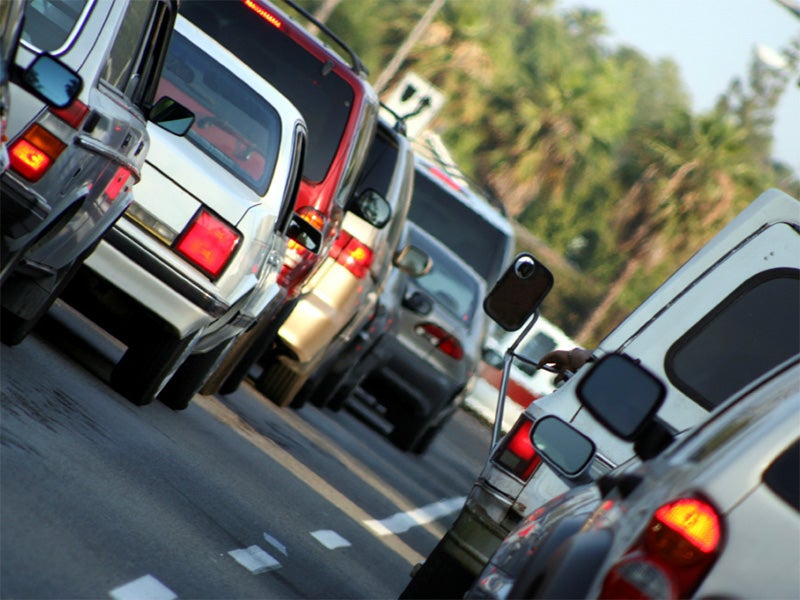A Puzzler: How Can Weaker Air Regs Create Cleaner Air?
The California Air Resources Board seeks to relax existing regulations on diesel trucks and buses.

This page was published 11 years ago. Find the latest on Earthjustice’s work.
For as long as I have been working on air pollution issues in California, I can still be left speechless by agency decision-making—such as the recent proposal by the California Air Resources Board to relax regulations requiring the cleanup of diesel trucks and buses.
First let me say that CARB is to be commended for adopting these groundbreaking regulations in the first place. The rules, first adopted in 2008, will require owners and operators over the next 10 years to upgrade their old, dirty diesel trucks and buses operating in California. This rule is a central piece of the strategies to meet soot and smog standards in the San Joaquin Valley and Los Angeles.
That said, this is only a down payment on where we need to go to meet smog standards in this state. Based on CARB’s own analysis, to meet EPA’s 2008 smog (ozone) standard by the Clean Air Act deadline of 2032 in the San Joaquin Valley and the L.A. Basin, California will need to replace nearly all of these clean(er) diesel trucks and buses with zero- and near-zero-emitting technologies; and sales of new conventionally fueled diesel trucks will need to be eliminated altogether. This may sound like a long time to meet the standard, but we must start now if we want to totally transform the hundreds of thousands of trucks and buses on California’s roads.
So, obviously advocates were a little disappointed when CARB announced that instead of adopting the next generation of truck and bus standards, it wanted first to relax the 2008 regulations to allow more compliance flexibility and defer some of the promised emission reductions. The kicker, however, was the justification for the relaxation provided in the March 2014 staff report. After explaining the agency’s desire to allow some relief to truck owners and operators, the report attempts to explain why the emissions increases that would be allowed are small and inconsequential.
The Clean Air Act requires both L.A. and the San Joaquin Valley to come into compliance with the 1997 soot (PM2.5) standards by the end of this year. As I mentioned, the truck and bus rule was a key part of the plan for attain these standards. The CARB staff report explains that the emissions increases that will result from the proposed relaxation will not affect L.A.’s ability to attain because current air quality data suggest that the L.A. Basin is already meeting the standard and the increase in emissions allowed by these rule changes will not be enough to change those results.
Okay, we get it. We may not agree that all of the embedded facts are true, but at least there is some sense of a reasonable/responsible position.
For the San Joaquin Valley (it seems like the most outrageous air pollution decisions always start this way), the staff report states:
Weather conditions in the San Joaquin Valley this last December and January have been very conducive to PM2.5 formation, and high levels above the standard have been measured frequently. As a result, for the region to attain the annual PM2.5 standard this year, the remainder of 2014 will need to be especially clean … In light of these recent conditions, the proposed amendments would not have any appreciable impact on whether or not measured PM2.5 levels for the remainder of the year are low enough for the 3-year average to meet the standard.
Allow me to translate: “The air is so dirty in the San Joaquin Valley that it is not going to meet the national soot standards this year no matter what we do, so it doesn’t matter if we change the rules to allow more pollution.” This is the rationale from the state agency responsible for addressing air pollution and protecting public health.
There is no suggestion that, given the air quality predicament in the Valley, maybe CARB should be exploring ways to reduce emissions. There is no acknowledgment that Valley residents are suffering and dying as a result of the current levels of pollution, no sense of urgency, and no recognition of failed responsibility. Nothing. It is jaw-dropping and par for the course all at the same time.
The board of CARB still has to approve weakening these regulations before these changes can go into effect. Let’s hope they reject this absurd weakening of key health protections, and stand up for clean air.
The California Regional Office fights for the rights of all to a healthy environment regardless of where in the state they live; we fight to protect the magnificent natural spaces and wildlife found in California; and we fight to transition California to a zero-emissions future where cars, trucks, buildings, and power plants run on clean energy, not fossil fuels.